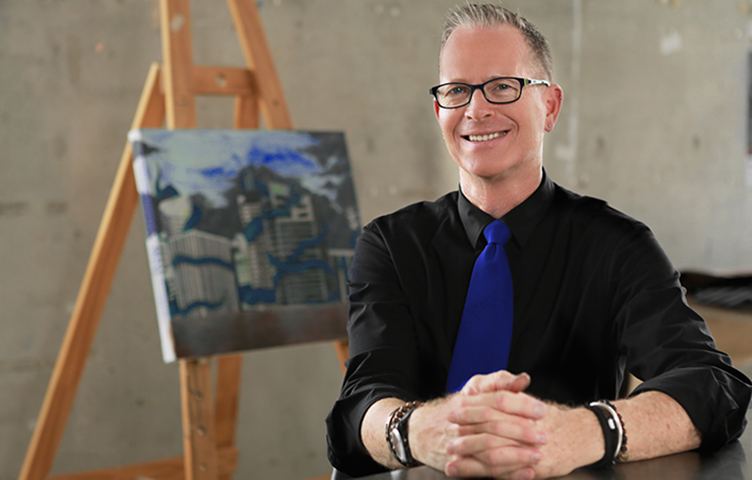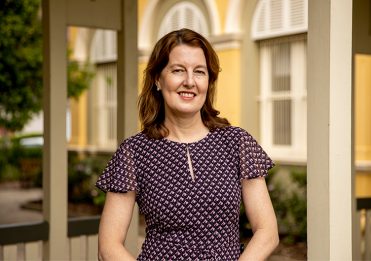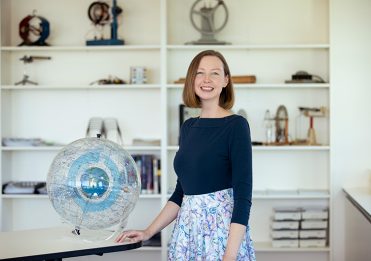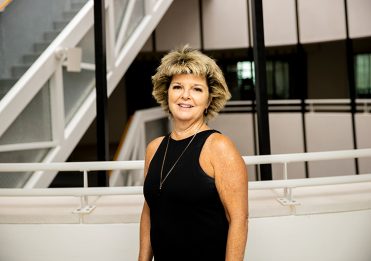
Mr Donald Pincott, Head of Visual Art, could not tell you where his aspiration to teach came from, but he knows that he has wanted to be a teacher since he was a child. He says his practice of constant learning has kept him engaged and passionate about his vocation during more than 30 years at the School.
The advice I find myself sharing most is about perspective. Live in the moment, but realise it’s not the only thing that matters. It can sometimes be difficult, for students in particular, to understand that.
I tell them: ‘Be who you are, do your best, but if it doesn’t work now, it’ll work later and that’s OK. Be brave.’ That’s something that I have learned over the years—it’s something that comes with experience. That’s why we need experienced teachers in schools, alongside the younger teachers who can learn from them.
I started working at Girls Grammar as a Visual Art Teacher in 1982—this was my first job. During my time here, I have held a few different roles: Head of England House in the 1980s; first Director of Creative Arts in the late 1990s; and I have been Head of Visual Art for about 14 years now. I am also the School’s Mindfulness Facilitator.
I have always had the vocation of teaching. There are no teachers in my family, so I’m not sure where the desire came from, but even as a child I knew absolutely that I wanted to be a teacher.
I studied a three-year Diploma of Art Teaching first. I then completed a Bachelor of Arts, majoring in Studies of Religion and German, and eventually also a Master of Education in Leadership and Management, specifically focusing on Gender Studies. After that, I also completed a Master of Learning Innovation, which focused more on support for classroom teachers.
Outside of the classroom context, I am a qualified Yoga and Meditation instructor, and a Fitness Instructor. I speak German, as well as some French, Italian, Hebrew and Greek.
One of the first people who introduced me to lifelong learning was Mrs Judith Hancock (Principal, 1977 to 2001), and I embraced that philosophy wholeheartedly—I believe that it has made me who I am, and kept me fresh all these years. I truly believe that as teachers, we should always be learning.
What has kept me here is my belief in the School and the principles that underpin the education we provide girls. In my first interview, I said I want to work somewhere where there is a high level of excellence in teaching.
I feel particularly fortunate to be here, in a girls’ school. I consider myself a feminist, and I appreciate having the space to discuss the issues of gender equality that are of our era. I’m privileged to be able to contribute to that conversation.
When we discuss these issues in class, I say to the girls, ‘you can do anything you want to do—but realise that the world of the School is not exactly like the wider world. You will have to fight sometimes, and overcome challenges that will inevitably present themselves.’
Part of preparing the girls for the wider world is giving them effective tools to be able to thrive, no matter their circumstances—and I’m honoured to be able to give them the tool of mindfulness.
The Mindfulness program came about because Mrs Jody Forbes, Director of Student Counselling, recognised that the girls would benefit from a positive and powerful tool to enhance resilience and deal with the general ‘stuff’ life throws at us, particularly during the adolescent years. Jody approached me about this role, and it was a really nice fit.
The program has expanded since its inception. I now teach the Year 8 cohort the structured .b Mindfulness program, and also lead many less formal practices in meetings with staff.
Certainly, staff benefit from mindfulness as well. In the time that I have been a teacher, the job has become much more professional. Teachers need to be consistent in their personality and approach to others, and always be supportive. Yet we must also still be authentic and real—it’s a delicate psychological balance.
I do think teachers need a healthy separate life away from work. Whatever you are in a school, you need to counter-balance it in your private life—it is the same for all professionals in any field; separation is important.
Yet, despite the necessary professional restraint that we must show, at its heart, a school is a caring organisation. It’s so nice to teach daughters of girls I have taught. I have taught Mrs Sybil Edwards, and Miss Ellena Papas. That intergenerational aspect really adds strength to our School community.
The people around you make the difference. When I was a young teacher, I looked up to the older teachers, and they mentored me in subtle and unstructured ways. I try to do that now.
Again, it’s about perspective. If you aren’t happy, change the course of your life. Relax and do your best, pull back and realise that this one detail isn’t the whole picture—it’s much bigger. At the same time, you can be whatever you want to be, so still hold onto your ambitions and dreams. Not a lot of the detail in our daily life really matters; there is always a way forward.
The things that really matter are having integrity, being honest and doing the right thing, speaking well to others, and acting in the manner that is expected as part of this community.
There are a lot of people here who also believe in this ethos. Over the years I have worked with many amazing and talented women, which in my opinion is what makes this place special.




